 Ever since I [announced](http://johnaugust.com/archives/2007/the-big-red-cheese) that I’m writing Shazam!/Captain Marvel, I’ve gotten some great questions and comments from longtime fans of the character, many with detailed pleas to include a specific cherished piece of the mythology.
Ever since I [announced](http://johnaugust.com/archives/2007/the-big-red-cheese) that I’m writing Shazam!/Captain Marvel, I’ve gotten some great questions and comments from longtime fans of the character, many with detailed pleas to include a specific cherished piece of the mythology.
But when I tell people face-to-face that I’m writing a Captain Marvel movie, I often notice a specific micro-reaction. Their eyes go up and to the left as they try to remember, who the hell is Captain Marvel? Half the time, they come up with Captain America instead.
So, in the interest of spreading general knowledge about Captain Marvel and why he kicks ass, I thought I’d share a reading list. Don’t worry; there’s no test. In fact, consider this a gentle education (or re-education) on why some of the best writing today is inked and colored.
Getting over comic anxiety
One reason adults can be scared off from comics is that the universes in which superheroes live tend to be incredibly complicated and interconnected. It’s the same reason I haven’t started watching Battlestar Galactica — I feel like I need to catch the first few seasons on DVD.
But it’s even more bewildering than that. You can think of any comic book series (Batman, Superman, JSA) as being roughly equivalent to a television series, with each issue serving much like an episode.
You’d want a guidebook. A cheat sheet.
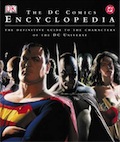 For the DC Universe in which Captain Marvel lives, the most helpful resource I’ve found is the [DC Comics Encyclopedia](http://astore.amazon.com/johnaugustcom-20/detail/075660592X/103-6872397-4470203).
For the DC Universe in which Captain Marvel lives, the most helpful resource I’ve found is the [DC Comics Encyclopedia](http://astore.amazon.com/johnaugustcom-20/detail/075660592X/103-6872397-4470203).
Still, it’s invaluable. I’ve been paging through this book for the last two years,
Getting up to speed on Captain Marvel
Captain Marvel was originally published by Fawcett Comics, and for a time outsold Superman — in fact, it was a copyright infringement lawsuit that led to Fawcett ceasing publication.
Because Marvel Comics trademarked their Captain Marvel comic book during the interim between the original Captain Marvel’s Fawcett years and DC years, DC Comics is unable to promote and market their Captain Marvel/Marvel Family properties under that name. Since 1972, DC has instead used the trademark Shazam! as the title of their comic books and thus the name under which they market and promote the character. Consequently, Captain Marvel himself is sometimes erroneously referred to as “Shazam.”
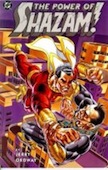 A fairly classic genesis story for Captain Marvel can be found in Jerry Ordway’s [The Power of Shazam!](http://astore.amazon.com/johnaugustcom-20/detail/1563891530/103-6872397-4470203) It’s semi-period and kind of Mummy-like (a lot of Egyptian tomb business), but manages to evoke a vintage feel without the vintage dullness.
A fairly classic genesis story for Captain Marvel can be found in Jerry Ordway’s [The Power of Shazam!](http://astore.amazon.com/johnaugustcom-20/detail/1563891530/103-6872397-4470203) It’s semi-period and kind of Mummy-like (a lot of Egyptian tomb business), but manages to evoke a vintage feel without the vintage dullness.
While he rarely has his own series, you find Captain Marvel sprinkled throughout the DC world. He’s particularly helpful when you need someone to go head-to-head with Superman. Captain Marvel isn’t vulnerable to kryptonite, and holds up better than the Man of Steel against magic.
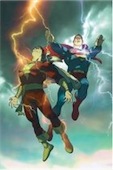 A good place to start is Judd Winick’s [First Thunder](http://astore.amazon.com/johnaugustcom-20/detail/1401209238/103-6872397-4470203), which posits the first real encounter between these titans, and nicely contrasts not only the two heroes but their corresponding villains, Lex Luthor and Dr. Sivana. The book smartly moves beyond the smash-and-bash action to raise interesting questions: Is it fair to put this much responsibility on a young kid? Which identity is your “secret identity?” And what would Superman have done without the Kents to watch over him?
A good place to start is Judd Winick’s [First Thunder](http://astore.amazon.com/johnaugustcom-20/detail/1401209238/103-6872397-4470203), which posits the first real encounter between these titans, and nicely contrasts not only the two heroes but their corresponding villains, Lex Luthor and Dr. Sivana. The book smartly moves beyond the smash-and-bash action to raise interesting questions: Is it fair to put this much responsibility on a young kid? Which identity is your “secret identity?” And what would Superman have done without the Kents to watch over him?
[Day of Vengeance](http://astore.amazon.com/johnaugustcom-20/detail/1401208401/103-6872397-4470203) (also by Judd Winick) features a very different Marvel/Superman matchup, as the Man of Steel finds himself possessed by the demon Eclipso. It’s a good battle, and it makes use of one of the Marvel family’s less-defined abilities: the magic thunderbolts which come when you call, “Shazam!” These thunderbolts can seemingly do anything. I keep waiting for some unhinged environmentalist to figure out he can use them to power the world’s electric grid — *but at a deadly price!*
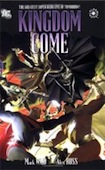 If you want bleak, look no further than Mark Wald’s [Kingdom Come](http://astore.amazon.com/johnaugustcom-20/detail/1563893304/103-6872397-4470203), in which the grown up Billy Batson is basically Lex Luthor’s pawn, a superpowered goon to protect the evil mastermind from Superman. Between this and [Watchmen](http://astore.amazon.com/johnaugustcom-20/detail/1401207138/103-6872397-4470203), one is left with the impression that superheroes don’t get better with age.
If you want bleak, look no further than Mark Wald’s [Kingdom Come](http://astore.amazon.com/johnaugustcom-20/detail/1563893304/103-6872397-4470203), in which the grown up Billy Batson is basically Lex Luthor’s pawn, a superpowered goon to protect the evil mastermind from Superman. Between this and [Watchmen](http://astore.amazon.com/johnaugustcom-20/detail/1401207138/103-6872397-4470203), one is left with the impression that superheroes don’t get better with age.
JSA and Black Adam
Captain Marvel can be found in many Justice Society of America books, but an even larger presence is Black Adam, who is sometimes an ally and often an adversary. Black Adam was the original champion chosen by the wizard Shazam, and is ostensibly as powerful as The Big Red Cheese. But he’s brutal and charismatic, which is why fans love him no matter which side he’s on.
Geoff Johns, who was gracious enough to listen to my pitch before we went in to New Line, has two books featuring Black Adam to check out: [Black Reign](http://astore.amazon.com/johnaugustcom-20/detail/1401204805/103-6872397-4470203) and [Black Vengeance](http://astore.amazon.com/johnaugustcom-20/detail/1401209661/103-6872397-4470203). The storylines continue into this past year’s [52](http://astore.amazon.com/johnaugustcom-20/detail/1401213537/103-6872397-4470203).
For a one-off making good use of the Rock of Eternity (home base of Captain Marvel), check out [Virtue and Vice](http://astore.amazon.com/johnaugustcom-20/detail/1401200400/103-6872397-4470203). Featuring both the JSA and the Justice League, it’s a sampler platter of powers and what-if scenarios, but well worth a look.
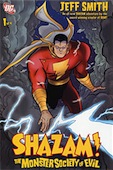 Among current series, Judd Winick’s [Trials of Shazam!](http://astore.amazon.com/johnaugustcom-20/detail/1401213316/103-6872397-4470203) finds Billy Batson taking over for the wizard, and overseeing the training of his replacement. Meanwhile, Jeff Smith’s [Shazam!: The Monster Society of Evil](http://www.dccomics.com/comics/?cm=6829) is goofy and whimsical, a great alternative to the weary darkness of many comics today.
Among current series, Judd Winick’s [Trials of Shazam!](http://astore.amazon.com/johnaugustcom-20/detail/1401213316/103-6872397-4470203) finds Billy Batson taking over for the wizard, and overseeing the training of his replacement. Meanwhile, Jeff Smith’s [Shazam!: The Monster Society of Evil](http://www.dccomics.com/comics/?cm=6829) is goofy and whimsical, a great alternative to the weary darkness of many comics today.
Why I’m not including the vintage collections
DC publishes hardcover anthologies that gather up decades’ worth of Captain Marvel comics. If I were writing a dissertation on the evolution of the Captain Marvel character, these would be invaluable. But I’m not. So every time I read one of these, I’m struck with the same realization I encounter trying to watch The Honeymooners or a black-and-white movie: Wow. Old things suck.
Yes, I know that will piss off the vintage comics fans, who insist that the original incarnations are the purest forms of a character. But what you quickly realize is that old-time comic books were awkwardly written, crudely drawn, and bewilderingly inconsistent with their rules. They were making up the art form as they went along, and today’s comic books are better for the accumulated wisdom.
Vintage fans are free to disagree. There’s a vast but finite amount of comic books to last them through their days.
Beyond that, are there great books I’m leaving off, either intentionally or accidentally? Almost certainly. The comments are your chance to add to the reading list.
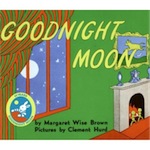 ](http://astore.amazon.com/johnaugustcom-20/103-7231239-6222202?%5Fencoding=UTF8&node=28)Anyone who’s ever had a baby has probably read this book, so it’s no surprise that Hollywood’s been trying to adapt it for years. [Robert Bolt](http://imdb.com/name/nm0004122/) wrote a draft, as have [Waldo Salt](http://imdb.com/name/nm0759029/) and [Andrew Kevin Walker](http://imdb.com/name/nm0001825/) (his version had [Tom Tykwer](http://imdb.com/name/nm0878756/) attached.) So will this new incarnation be the one that finally gets it made? Hard to say.
](http://astore.amazon.com/johnaugustcom-20/103-7231239-6222202?%5Fencoding=UTF8&node=28)Anyone who’s ever had a baby has probably read this book, so it’s no surprise that Hollywood’s been trying to adapt it for years. [Robert Bolt](http://imdb.com/name/nm0004122/) wrote a draft, as have [Waldo Salt](http://imdb.com/name/nm0759029/) and [Andrew Kevin Walker](http://imdb.com/name/nm0001825/) (his version had [Tom Tykwer](http://imdb.com/name/nm0878756/) attached.) So will this new incarnation be the one that finally gets it made? Hard to say.